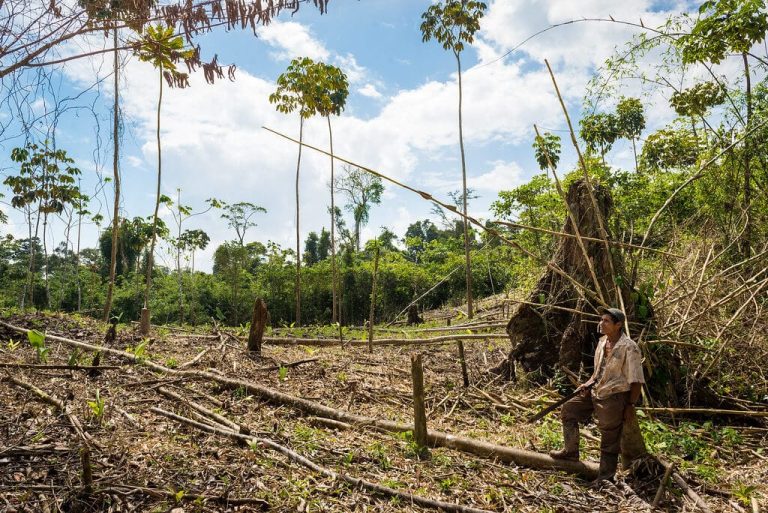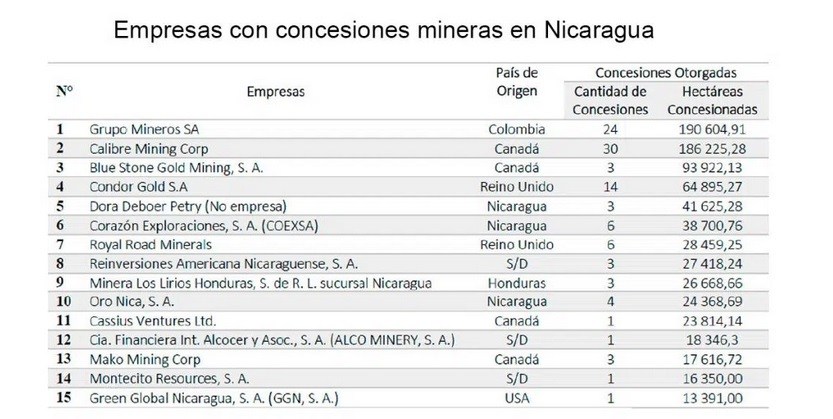19 de julio 2022

Children of Exile: The Births “Sowing Hope” in the Camp of Nicaraguan Farmers

PUBLICIDAD 1M
PUBLICIDAD 4D
PUBLICIDAD 5D
The analysis of the Fundacion del Rio also reveals that the number of hectares given over to mining has increased up to six times more

Nicaragua is the Central American country with the largest quantity of mining concessions in territories belonging to their indigenous peoples and Afro-descendant citizens. This statistic is revealed by the monitoring report “Nicaragua and its perverse gold”, issued by the Fundacion del Rio [“River Foundation”]. According to their report, up until 2021, they counted 141 mining concessions in these territories.
“The Government has declared areas for mining without even consulting with the indigenous owners. Instead of guaranteeing their territorial rights, it partners with transnational organizations that establish themselves in these areas to loot and plunder the most impoverished communities,” the report accuses.
According to the Fundacion del Rio, there are five mining concessions that directly affect the Chorotega territories; one in a territory belonging to the Matagalpas; six in the Mayangna’s lands; seven in the Miskito territory and one in the territories belonging jointly to the Mayangnas and Miskitos.
“We’ve totaled 69 mining concessions in territories of the indigenous and Afro-descendants, and 72 that have been requested; in addition, 42 plots have been declared areas of mining reserves. In other words, a total of 183 plots in the indigenous territories have been usurped for concessions or areas of mining reserves,” the staff explained.
The report from the River Foundation is based on analysis of a database constructed from the official information of the Nicaraguan Ministry of Mining and Industry and a map of the mining rights. It also includes independent information gathered by organizations and institutions that have investigated the mining sector in Nicaragua.
“Nineteen companies have been identified, with mining concessions either awarded or requested within the territories belonging to the indigenous groups and Afro-descendants. However, five of them hold the majority share (65%) of concessions,” they note.
The three largest companies in these territories are: Calibre Mining Nicaragua S.A. [Canadian based]; HEMCO Nicaragua S.A.[Colombian]; and CXB Nicaragua S.A. [Nicaraguan] which sold part of their mining rights to the Calibre Corp. There are also 42 areas set aside for mining reserves that are controlled by the Nicaraguan Mining Company (ENAMINAS) and the Ministry of Mining and Energy.
“The organization calls on the rural, indigenous and Afro-descendant communities to resist this onslaught and the model of looting and plunder that the Ortega-Murillo regime – in conjunction with the mining companies – is imposing, and to request the support of the international community, the environmental organizations and Nicaraguan society to accompany and fortify the denunciation of the metals industry,” the document states.
The analysis of the Fundacion del Rio also reveals that the number of hectares given over to mining has increased up to six times more with the Ortega government than with the three previous governments. The latter governments together conceded a total of 139,852 hectares to mining, whereas in the 16 years of Ortega’s rule, they’ve turned over 782,628 hectares, representing 6.5% of the national territory.
Of the companies that control the mining concessions there are five – mostly foreign companies – that manage 60% of the hectares set aside.
“We’ve identified the companies of Canadian origin as those possessing the greatest area of concessions. Together, they comprise 35% of the area conceded. Just one Colombian company has 21% of the area under concession, while Nicaraguan companies have 11%, and companies from the United Kingdom have 10%,” the report details.

The River Foundation also documented that 66% of the Bosawas Biosphere Reserve has been ceded for industrial and rustic gold mining. “The total area of 98 plots for mining represents 1.3 milion hectares – 66% of the entire reserve. The companies most benefited by these concessions are [Candian based] Calibre Mining Corp. through its Calibre Mining Nicaragua S.A. subsidiary. The company has also benefited from other companies that have sold them their mining rights.”
Bosawas was declared a biosphere reserve by UNESCO in 1997. As such, the mining companies are violating the framework of the environmental laws by carrying out activities of exploration and mining exploitation, the Foundation stated.
“According to an analysis of the map of concessions within the reserve, 79 concessions correspond to mining companies: 60 have been awarded and 19 are in progress. There are also 19 plots that are considered areas of mining reserves under the discretional administration of the Ministry of Mining and Energy,” the report states.
*This article wa originaly pusblished in Confidendencial and traslated by Havana Times
Archivado como:
PUBLICIDAD 3M
Confidencial es un diario digital nicaragüense, de formato multimedia, fundado por Carlos F. Chamorro en junio de 1996. Inició como un semanario impreso y hoy es un medio de referencia regional con información, análisis, entrevistas, perfiles, reportajes e investigaciones sobre Nicaragua, informando desde el exilio por la persecución política de la dictadura de Daniel Ortega y Rosario Murillo.
PUBLICIDAD 3D